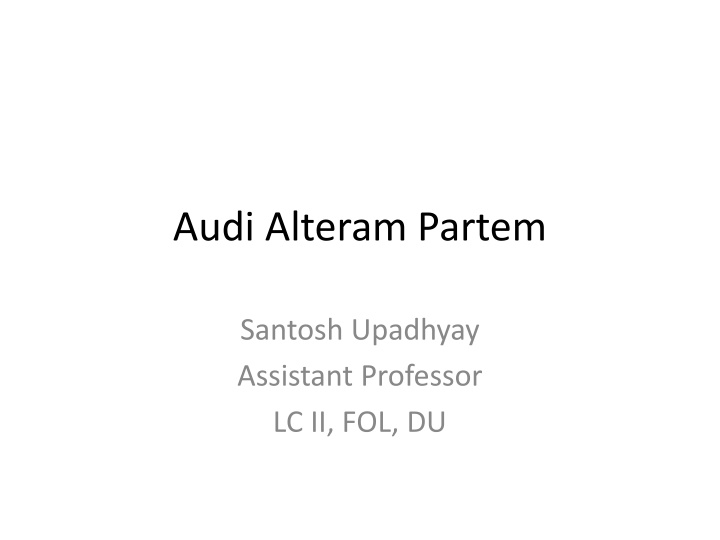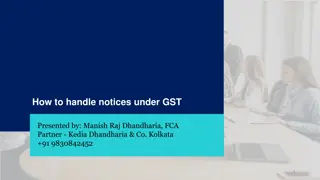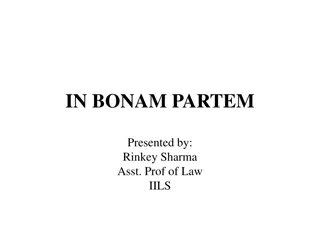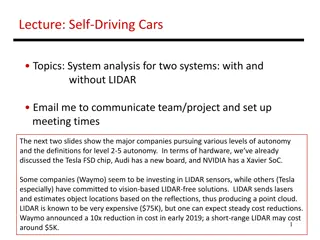
Audi Alteram Partem
Explore the fundamental concept of fairness and justice in human society through the principle of Audi Alteram Partem, which ensures that both sides are heard before passing a judgement. This principle is a basic requirement of the rule of law and is essential for upholding civilised society.
Download Presentation

Please find below an Image/Link to download the presentation.
The content on the website is provided AS IS for your information and personal use only. It may not be sold, licensed, or shared on other websites without obtaining consent from the author. If you encounter any issues during the download, it is possible that the publisher has removed the file from their server.
You are allowed to download the files provided on this website for personal or commercial use, subject to the condition that they are used lawfully. All files are the property of their respective owners.
The content on the website is provided AS IS for your information and personal use only. It may not be sold, licensed, or shared on other websites without obtaining consent from the author.
E N D
Presentation Transcript
Audi Alteram Partem Santosh Upadhyay Assistant Professor LC II, FOL, DU
No one should be condemned unheard, Both the sides must be heard before passing a judgement. Basic requirement of rule of law, the most fundamental and foundational concept of fairness and justice in human society. Basic jurisprudential principle of civilised society. A party is not to suffer in person or in purse without an opportunity of being heard.
Right to Cross Examination H N Mishra v Principal Rajendra Medical College The appellants were the student of medical college. They were misbehaviour with girls inside the premises of the Girls hostel. The complaint was made against them and after the inquiry, they were found guilty and rusticated from the college for two years. They claimed that principles of Natural Justice were not complied because the name of the complainants were not told to them, neither any opportunity of cross examining of witnesses were provided to them. accused of serious
While rejecting their claims, Court observed that: The college authorities are in no position to protect the girl students outside the college precincts. Therefore, the authorities had to devise a just and reasonable plan of enquiry which, on the one hand, would not expose the individual girls to harassment by the male students and, on the other, secure reasonable opportunity to the accused to state their case. Accordingly, an Enquiry Committee of three independent members of the staff was appointed. There is no suggestion whatsoever that the members of the Committee were anything but respectable and independent. The Committee called the girls privately and recorded their statements. Thereafter the students named by them were called. The complaint against them was explained to them. The written charge was handed over and they were asked to state whatever they had to state in writing. The Committee was not satisfied with the explanation given and thereafter made the report. We think that under the circumstances of the case the requirements of natural justice were fulfilled.
Taking all the circumstances into account it is not possible to say that rules of natural justice had not been followed. In Board of Education v. Rice [1911 AC 179], Lord Loreburn laid down that in disposing of a question, which was the subject of an appeal to it, the Board of Education was under a duty to act in good faith, and to listen fairly to both sides, inasmuch as that was a duty which lay on everyone who decided anything. He did not think that the Board was bound to treat such a question as though it were a trial. The Board need not examine witnesses. It could, he thought, obtain information in any way it thought best, always giving a fair opportunity to those who were parties in the controversy to correct or contradict any relevant statement prejudicial to their view. More recently in Russell v. Duke of Norfolk (1949) 1 All ER 109, 118 Tucker, L.J. observed There are, in my view, no words which are of universal application to every kind of inquiry and every kind of domestic tribunal. (Para, 12)
The requirements of natural justice must depend on the circumstances of the case, the nature of the inquiry, the rules under which the tribunal is acting, the subject-matter that is being dealt with, and so forth. Accordingly, [the Court] does not derive much assistance from the definitions of natural justice which have been from time to time used, but whatever standard is adopted, one essential is that the person accused should have a reasonable opportunity of presenting his case.
Rules of natural justice cannot remain the same applying to all conditions. We know of statutes in India like the Goonda Acts which permit evidence being collected behind the back of the goonda and the goonda being merely asked to represent against the main charges arising out of the evidence collected. Care is taken to see that the witnesses who gave statements would not be identified. In such cases there is no question of the witnesses being called and the goonda being given an opportunity to cross-examine the witnesses. The reason is obvious. No witness will come forward to give evidence in the presence of the goonda. However unsavoury the procedure may appear to a judicial mind, these are facts of life which are to be faced. The girls who were molested that night would not have come forward to give evidence in any regular enquiry and if a strict enquiry like the one conducted in a court of law were to be imposed in such matters, the girls would have had to go under the constant fear of molestation by the male students who were capable of such indecencies. Under the circumstances the course followed by the Principal was a wise one. The Committee whose integrity could not be impeached collected and shifted the evidence given by the girls. Thereafter the students definitely named by the girls were informed about the complaint against them and the charge. They were given an opportunity to state their case. We do not think that the facts and circumstances of this case require anything more to be done.
Right of Legal Representation J K Aggarwal v. Haryana Seeds Development Corpn Ltd: Appellant was the Company Secretary in the Respondent Corporation. The legal issue that was in question was whether in the course the disciplinary inquiry initiated against the appellant by the Corporation on certain charges, which if established might lead to appellant s dismissal from service, appellant was entitled to engage the services of a legal practitioner in the conduct of his defence. The provisions of enquiry and dismissal of the appellant was governed by Rule 7(5) of the Haryana Civil Services (Punishment and Appeal) Rules, 1952: 7.(5) Where the punishing authority itself enquires into any charge or charges or appoints an enquiry officer for holding enquiry against a person in the service of the government, it may, by an order, appoint a government servant or a legal practitioner to be known as a presenting officer to present on its behalf the case, in support of the charge or charges. The person against whom a charge is being enquired into, shall be allowed to obtain the assistance of a government servant, if he so desires, in order to produce his defence before the enquiring officer. If the charge or charges are likely to result in the dismissal of the person from the service of the government. Such person may, with the sanction of the enquiry officer, be represented by counsel.
Lord Denning observed in Pett v. Greyhound Racing Association Ltd., (1969): I should have thought, therefore, that when a man s reputation or livelihood is at stake, he not only has a right to speak by his own mouth. He also has a right to speak by counsel or solicitor. Enderby Town Football Club Ltd. v. Football Association Ltd. [1971 Ch D 591, 605-06]: Is a party who is charged before a domestic tribunal entitled as of right to be legally represented? Much depends on what the rules say about it. When the rules say nothing, then the party has no absolute right to be legally represented. It is a matter for the discretion of the tribunal. They are masters of their own procedure: and, if they, in the proper exercise of their discretion, decline to allow legal representation, the courts will not interfere . In many cases it may be a good thing for the proceedings of a domestic tribunal to be conducted informally without legal representation. Justice can often be done in them better by a good layman than by a bad lawyer . But I would emphasise that the discretion must be properly exercised. The tribunal must not fetter its discretion by rigid bonds. A domestic tribunal is not at liberty to lay down an absolute rule The tribunal must be ready, in a proper case, to allow it. .
Court observed that: the respondent-Corporation was represented by its Personnel and Administration Manager who is stated to be a man of law. The rule itself recognises that where the charges are so serious as to entail a dismissal from service the inquiry authority may permit the services of a lawyer. This rule vests discretion. In the matter of exercise of this discretion one of the relevant factors is whether there is likelihood of the combat being unequal entailing a miscarriage or failure of justice and a denial of a real and reasonable opportunity for defence by reasons of the appellant being pitted against a presenting officer who is trained in law A decision has to be reached on a case to case basis on the situational particularities and the special requirements of justice of the case Board of Trustees of the Port of Bombay v. Dilipkumar [(1983) Court observed that: In our view we have reached a stage in our onward march to fair play in action that where in an enquiry before a domestic tribunal the delinquent officer is pitted against a legally trained mind, if he seeks permission to appear through a legal practitioner the refusal to grant this request would amount to denial of a reasonable request to defend himself and the essential principles of natural justice would be violated....
Court further observed that: the refusal to sanction the service of a lawyer in the inquiry was not a proper exercise of the discretion under the rule resulting in a failure of natural justice; particularly, in view of the fact that the Presenting Officer was a person with legal attainments and experience. It was said that the appellant was no less adept having been in the position of a Senior Executive and could have defended, and did defend, himself competently; but as was observed by the learned Master of Rolls in Pett case that in defending himself one may tend to become nervous or tongue-tied . Moreover, appellant, it is claimed, has had no legal background. The refusal of the service of a lawyer, in the facts of this case, results in denial of natural justice.
Bharat Petroleum Corpn. Ltd. v Maharashtra General Kamgar Union The Industrial Employment (Standing Orders) Act, 1946 was made by Parliament to require employers of all industrial establishments to define formally the conditions of employment on which the workmen would be engaged. The object underlying this Act, which is a beneficent piece of legislation, is to introduce uniformity of terms and conditions of employment in respect of workmen belonging to the same category and discharging the same and similar work establishment and to make the terms and conditions of industrial employees well settled and known to the employees before they accept the employment. under the industrial
The vital difference between the Model Standing Orders, as set out above, and the Draft Standing Orders, as certified by the appellate authority, is that while under the Model Standing Orders, a workman can be represented in the departmental proceedings by an office-bearer of a trade union of which he is a member, he does not have this right under the Draft Standing Orders, as certified by the appellate authority, which restrict his right of representation by a fellow workman of his choice from amongst the employees of the appellant-Corporation. The contention of the learned counsel for the appellant is that the Model Standing Orders framed by the Central Government under the Industrial Employment (Standing Orders) Central Rules, 1946 can operate only during the period of time when the Standing Orders are not made by the establishment itself. If and when those Standing Orders are made which, in any case, have to be compulsorily made in terms of the Act, they have to be submitted to the Certifying Officer and if they are certified, they take effect from the date on which they are notified and effectively replace the Model Standing Orders. The order of the Certifying Officer is appealable before the appellate authority and the appellate authority can legally interfere with the order passed by the Certifying Officer and set it aside or uphold it. There is no restriction under the Act that the management or the establishment, or, for that matter, the employer would adopt the Model Standing Orders. It is contended that the Standing Orders have only to be in consonance with the Model Standing Orders besides being fair and reasonable
The Model Standing Orders, no doubt, provided that a delinquent employee could be represented in the disciplinary proceedings through another employee who may not be the employee of the parent establishment to which the delinquent belongs and may be an employee elsewhere, though he may be a member of the trade union, but this rule of representation has not been disturbed by the Certified Standing Orders, inasmuch as it still provides that the delinquent employee can be represented in the disciplinary proceedings through an employee. The only embargo is that the representative should be an employee of the parent establishment. The choice of the delinquent in selecting his representative is affected only to the extent that the representative has to be a co-employee of the same establishment in which the delinquent is employed. There appears to be some logic behind this as a co- employee would be fully aware of the conditions prevailing in the parent establishment, its Service Rules, including the Standing Orders, and would be in a better position, than an outsider, to assist the delinquent in the domestic proceedings for a fair and early disposal. The basic features of the Model Standing Orders are thus retained and the right of representation in the disciplinary proceedings through another employee is not altered, affected or taken away. The Standing Orders conform to all standards of reasonableness and fairness and, therefore, the appellate authority was fully justified in certifying the Draft Standing Orders as submitted by the appellant.
Post- Decisional Hearing Maneka Gandhi v. Union of India : Appellant's Passport was impounded by the Government without affording her any opportunity of hearing under sec 10(3)(c) of Passports Act 1967 on the specific ground in the interests of the general public . This was challenged on many grounds and one of such ground was that an order under Section 10(3)(c) impounding a passport could not be made by the Passport Authority without giving an opportunity to the holder of the passport to be heard in defence and since in the present case, the passport was impounded by the Government without affording an opportunity of hearing to the petitioner, the order was null and void, and, in the alternative, if Section 10(3)(c) were read in such a manner as to exclude the right of hearing, the section would be infected with the vice of arbitrariness and it would be void as offendingArticle 14.
Court made following general observations about the Natural Justice: Natural justice is a great humanising principle intended to invest law with fairness and to secure justice and over the years it has grown into a widely pervasive rule affecting large areas of administrative action. It quoted Lord Morris We can take pride in what has been done particularly in the field of administrative law by invoking and by applying these principles which we broadly classify under the designation of natural justice. Many testing problems as to their application yet remain to be solved. But I affirm that the area of administrative action is but one area in which the principles are to be deployed. Nor are they to be invoked only when procedural failures are shown. Does natural justice qualify to be described as a majestic conception? I believe it does. Is it just a rhetorical but vague phrase which can be employed, when needed, to give a gloss of assurance? I believe that it is very much more. If it can be summarised as being fair-play in action - who could wish that it would ever be out of action?
Subsequently, it quoted from another judgement: ... We often speak of the rules of natural justice. But there is nothing rigid or mechanical about them. What they comprehend has been analysed and described in many authorities. But any analysis must bring into relief rather their spirit and their inspiration than any precision of definition or precision as to application. We do not search for prescriptions which will lay down exactly what must, in various divergent situations, be done. The principles and procedures are to be applied which, in any particular situation or set of circumstances, are right and just and fair. Natural justice, it has been said, is only fair play in action .
Attorney General argued that having regard to the nature of the action involved in the impounding of a passport, the audi alteram partem rule must be held to be excluded, because if notice were to be given to the holder of the passport and reasonable opportunity afforded to him to show cause why his passport should not be impounded, he might immediately, on the strength of the passport, make good his exit from the country and the object of impounding the passport would be frustrated. The argument was that if the audi alteram partem rule were applied, its effect would be to stultify the power of impounding the passport and it would defeat and paralyse the administration of the law and hence the audi alteram partem rule cannot in fairness be applied while exercising the power to impound a passport.
Replying with this argument, court observed that: This argument was sought to be supported by reference to the statement of the law in S. A. de Smith s Judicial Review of Administrative Action, 2nd ed, where the learned author says at page 174 that in administrative law a prima facie right to prior notice and opportunity to be heard may be held to be excluded by implication...... where an obligation to give notice and opportunity to be heard would obstruct the taking of prompt action, especially action of a preventive or remedial nature . Now, it is true that since the right to prior notice and opportunity of hearing arises only by implication from the duty to act fairly, or to use the words of Lord Morris of Borth-y-Gest, from fair-play in action , it may equally be excluded where, having regard to the nature of the action to be taken, its object and purpose and the scheme of the relevant statutory provision, fairness in action does not demand its implication and even warrants its exclusion.
Court observed that: There are certain well recognised exceptions to the audi alteram partem rule established by judicial decisions. The word exception is really a misnomer because in these exclusionary cases, the audi alteram pattern rule is held inapplicable not by way of an exception to fair-play in action , but because nothing unfair can be inferred by not affording an opportunity to present or meet a case. The audi alteram partem rule is intended to inject justice into the law and it cannot be applied to defeat the ends of justice, or to make the law lifeless, absurd, stultifying, self-defeating or plainly contrary to the common sense of the situation . Since the life of the law is not logic but experience and every legal proposition must, in the ultimate analysis, be tested on the touchstone of pragmatic realism, the audi alteram partem rule would, by the experiential test, be excluded, if importing the right to be heard has the effect of paralysing the administrative process or the need for promptitude or the urgency of the situation so demands. But at the same time it must be remembered that this is a rule of vital importance in the field of administrative law and it must not be jettisoned save in very exceptional circumstances where compulsive necessity so demands. It is a wholesome rule designed to secure the rule of law and the Court should not be too ready to eschew it in its application to a given case.
The audi alteram partem rule is not cast in a rigid mould and judicial decisions establish that it may suffer situational modifications. The core of it must, however, remain, namely, that the person affected must have a reasonable opportunity of being heard and the hearing must be a genuine hearing and not an empty public relations exercise. That is why Tucker, L.J., emphasised in Russel v. Duke of Norfolk that whatever standard of natural justice is adopted, one essential is that the person concerned should have a reasonable opportunity of presenting his case . What opportunity may be regarded as reasonable would necessarily depend on the practical necessities of the situation. It may be a sophisticated full-fledged hearing or it may be a hearing which is very brief and minimal: it may be a hearing prior to the decision or it may even be a post-decisional remedial hearing. The audi alteram partem rule is sufficiently flexible to permit modifications and variations to suit the exigencies of myriad kinds of situations which may arise.
It would not be right to conclude that the audi alteram partem rule is excluded merely because the power to impound a passport might be frustrated, if prior notice and hearing were to be given to the person concerned before impounding his passport The Passport Authority may proceed to impound the passport without giving any prior opportunity to the person concerned to be heard, but as soon as the order impounding the passport is made, an opportunity of hearing, remedial in aim, should be given to him so that he may present his case and controvert that of the Passport Authority and point out why his passport should not be impounded This should not only be possible but also quite appropriate, because the reasons for impounding the passport are required to be supplied by the Passport Authority after the making of the order and the person affected would, therefore, be in a position to make a representation setting forth his case and plead for setting aside the action impounding his passport. A fair opportunity of being heard following immediately upon the order impounding the passport would satisfy the mandate of natural justice and a provision requiring giving of such opportunity to the person concerned can and should be read by implication in the Passports Act, 1967. If such a provision were held to be incorporated in the Passports Act, 1967 by necessary implication, as we hold it must be, the procedure prescribed by the Act for impounding a passport would be right, fair and just and it would not suffer from the vice of arbitrariness or unreasonableness. We must, therefore, hold that the procedure established by the Passports Act, 1967 for impounding a passport is in conformity with the requirement of Article 21 and does not fall foul of that article.
H L Trehan v Union of India Through legislative mechanisms Government has acquisitioned the Caltex Refining India Ltd in 1977. Subsequently, the impugned circular was issued stating that the perquisites and allowances admissible to the Management staff would be rationalised in the manner stated in the said circular. It was argued before High Court that the said circular altered the service conditions of the management staffs to their detriment and this, without affording them any right to hearing; and High Court on this ground quashed the said circular.
SC Observed that: It is now a well established principle of law that there can be no deprivation or curtailment of any existing right, advantage government servant without complying with the rules of natural justice by giving the government servant concerned an opportunity of being heard. Any arbitrary or whimsical exercise of power prejudicially affecting the existing conditions of service of a government servant will offend against the provision of Article 14 of the Constitution. Admittedly, the employees of CORIL were not given an opportunity of hearing or representing their case before the impugned circular was issued by the Board of Directors. The impugned circular cannot, therefore, be sustained as it offends against the rules of natural justice or benefit enjoyed by a-
However, Company contended that after the impugned circular was made, the opportunity of hearing was provided. On this point, Court quoted KI Shephared case and also observed as follows: In our opinion, the post-decisional opportunity of hearing does not sub-serve the rules of natural justice. The authority that embarks upon a post- decisional hearing will naturally proceed with a closed mind and there is hardly any chance of getting a proper consideration of the representation at such a post- decisional opportunity once a decision has been taken, there is a tendency to uphold it and a representation may not yield any fruitful purpose. And the SC upheld the order of the High Court.
K.I. Shephard v. Union of India The Hindustan Commercial Bank, the Bank of Cochin Ltd. and Lakshmi Commercial Bank, which were private banks, were amalgamated with Punjab National Bank, Canara Bank and State Bank of India respectively in terms of separate schemes drawn under Section 45 of the Banking Regulation Act, 1949. Pursuant to the schemes, certain employees of the first mentioned three banks were excluded from employment and their services were not taken over by the respective transferee banks. Such exclusion was made without giving the employees, whose services were terminated, an opportunity of being heard and Court observed that: We may now point out that the learned Single Judge for the Kerala High Court had proposed a post-amalgamation hearing to meet the situation but that has been vacated by the Division Bench. .. there is no justification to think of a post-decisional hearing. On the other hand the normal rule should apply. It was also contended on behalf of the respondents that the excluded employees could not represent and their case could be examined. We do not think that would meet the ends of justice. They have already been thrown out of employment and having been deprived of livelihood they must be facing serious difficulties. There is no justification to throw them out of employment and then give them an opportunity of representation when the requirement is that they should have the opportunity referred to above as a condition precedent to action. It is common experience that once a decision has been taken, there is a tendency to uphold it and a representation may not really yields any fruitful purpose.
Requirement of Reasoned Decisions S. N. Mukherjee v Union of India As per section 164 of the Army Act, 1950 any person who is aggrieved by the findings of the court martial can present a petition to the designated officer requesting not to confirm the findings of the court martial and even after such confirment, the aggrieved person can again present a petition to the Central Government or any other prescribed authority. Court Martial awarded the sentence of dismissal to the employee. Then his petitions to the Chief of the Army Staff and thereafter post confirmation petition to the Central Government were dismissed without giving any reasons. The basic question in the case was whether the orders confirming the sentences of the Court Martial need to give reasons. Court has divided the whole issue into two heads: The question under consideration can be divided into two parts: (i) Is there any general principle of law which requires an administrative authority to record the reasons for its decision; and (ii) If so, does the said principle apply to an order confirming the findings and sentence of a court martial and post-confirmation proceeding under the Act?
164. (1) Any person subject to this Act who considers himself aggrieved by any order passed by any court martial may present a petition to the officer or authority empowered to confirm any finding or sentence of such court martial and the confirming authority may take such steps as may be considered necessary to satisfy itself as to the correctness, legality or propriety of the order passed or as to the regularity of any proceeding to which the order relates. (2) Any person subject to this Act who considers himself aggrieved by a finding or sentence of any court martial which has been confirmed, may present a petition to the Central Government, the Chief of the Army Staff or any prescribed officer superior in command to the one who confirmed such finding or sentence and the Central Government, the Chief of the Army Staff or other officer, as the case may be, may pass such orders thereon as it or he thinks fit.
On the first question, Court quoted many statements from different cases, it has quoted from Woolcombers of India Ltd. Case The giving of reasons in support of their conclusions by judicial and quasi-judicial authorities when exercising initial jurisdiction is essential for various reasons. First, it is calculated to prevent unconscious unfairness or arbitrariness in reaching the conclusions. The very search for reasons will put the authority on the alert and minimise the chances of unconscious infiltration of personal bias or unfairness in the conclusion. The authority will adduce reasons which will be regarded as fair and legitimate by a reasonable man and will discard irrelevant or extraneous considerations. Second, it is a well known principle that justice should not only be done but should also appear to be done. Unreasoned conclusions may be just but they may not appear to be just to those who read them. Reasoned conclusions, on the other hand, will have also the appearance of justice. Third, it should be remembered that an appeal generally lies from the decision of judicial and quasi-judicial authorities to this Court by special leave granted under Article 136. A judgment which does not disclose the reasons, will be of little assistance to the court.
Court observed that the requirement of recording reasons would (i) guarantee consideration by the authority; (ii) introduce clarity in the decisions; and (iii) minimize chances of arbitrariness in decision-making. And Court answered the first question except in cases where the requirement has been dispensed with expressly or by necessary implication, an administrative exercising judicial or quasi-judicial functions is required to record the reasons for its decision. authority
Insofar as the findings and sentence of a court martial and the proceedings for confirmation of such findings and sentence are concerned it has been found that the scheme of the Act and the Rules is such that reasons are not required to be recorded for the same. Has the legislature made a departure from the said scheme in respect of post-confirmation proceedings? There is nothing in the language of sub-section (2) of Section 164 which may lend support to such an intention. Nor is there anything in the nature of post-confirmation proceedings which may require recording of reasons for an order passed on the post-confirmation petition even though reasons are not required to be recorded at the stage of recording of findings and sentence by a court martial and at the stage of confirmation of the findings and sentence of the court martial by the confirming authority. With regard to recording of reasons the considerations which apply at the stage of recording of findings and sentence by the court martial and at the stage of confirmation of findings and sentence of the court martial by the confirming authority are equally applicable at the stage of consideration of the post-confirmation petition. Since reasons are not required to be recorded at the first two stages referred to above, the said requirement cannot, in our opinion, be insisted upon at the stage of consideration of post- confirmation petition under Section 164(2) of the Act. For the reasons aforesaid it must be held that reasons are not required to be recorded for an order passed by the confirming authority confirming the findings and sentence recorded by the court martial as well as for the order passed by the Central Government dismissing the post-confirmation petition.
Supply of Inquiry Report before Taking Action Managing Director, ECIL v B. Karunakar whether the report officer/authority who is appointed by the disciplinary authority to hold an inquiry into the charges against the delinquent employee, is required to be furnished to the employee to enable him to make proper representation to the disciplinary authority before such authority arrives at its own finding with regard to the guilt or otherwise of the employee and the punishment, if any, to be awarded to him. of the enquiry
Court observed that: It will thus be seen that where the enquiry officer is other than the disciplinary authority, the disciplinary proceedings break into two stages. The first stage ends when the disciplinary authority arrives at its conclusions on the basis of the evidence, enquiry officer s report and the delinquent employee s reply to it. The second stage begins when the disciplinary authority decides to impose penalty on the basis of its conclusions. If the disciplinary authority decides to drop the disciplinary proceedings, the second stage is not even reached. The employee s right to receive the report is thus, a part of the reasonable opportunity of defending himself in the first stage of the inquiry. If this right is denied to him, he is in effect denied the right to defend himself and to prove his innocence in the disciplinary proceedings
The position in law can also be looked at from a slightly different angle. Article 311(2) says that the employee shall be given a reasonable opportunity of being heard in respect of the charges against him . The findings on the charges given by a third person like the enquiry officer, particularly when they are not borne out by the evidence or are arrived at by overlooking the evidence or misconstruing it, could themselves constitute new unwarranted imputations. What is further, when the proviso to the said Article states that where it is proposed after such inquiry, to impose upon him any such penalty, such penalty may be imposed on the basis of the evidence adduced during such inquiry and it shall not be necessary to give such person any opportunity of making representation on the penalty proposed , it in effect accepts two successive stages of differing scope. Since the penalty is to be proposed after the inquiry, which inquiry in effect is to be carried out by the disciplinary authority (the enquiry officer being only his delegate appointed to hold the inquiry and to assist him), the employee s reply to the enquiry officer s report and consideration of such reply by the disciplinary authority also constitute an integral part of such inquiry. The second stage follows the inquiry so carried out and it consists of the issuance of the notice to show cause against the proposed penalty and of considering the reply to the notice and deciding upon the penalty. What is dispensed with is the opportunity of making representation on the penalty proposed and not of opportunity of making representation on the report of the enquiry officer. The latter right was always there.
Hence it has to be held that when the enquiry officer is not the disciplinary authority; the delinquent employee has a right to receive a copy of the enquiry officer s report before the disciplinary authority arrives at its conclusions with regard to the guilt or innocence of the employee with regard to the charges levelled against him. That right is a part of the employee s right to defend himself against the charges levelled against him. A denial of the enquiry officer s report before the disciplinary authority takes its decision on the charges, is a denial of reasonable opportunity to the employee to prove his innocence and is a breach of the principles of natural justice.





















